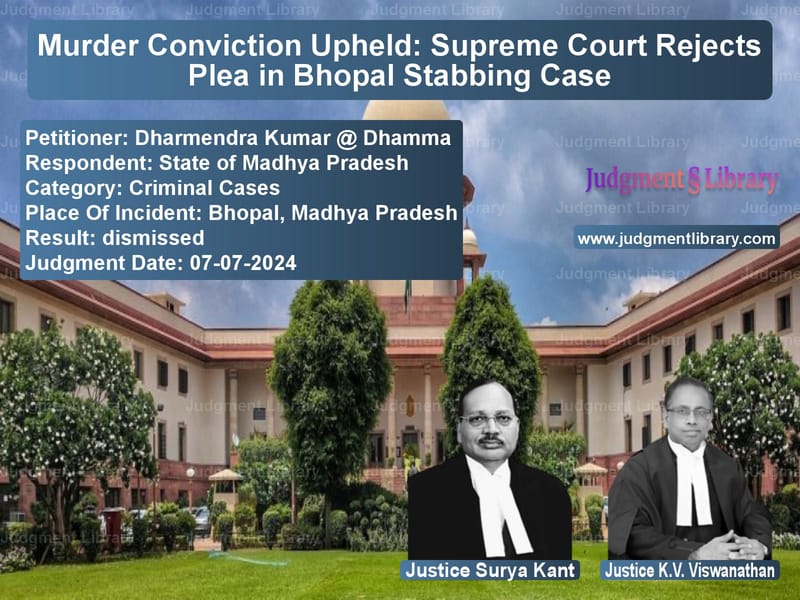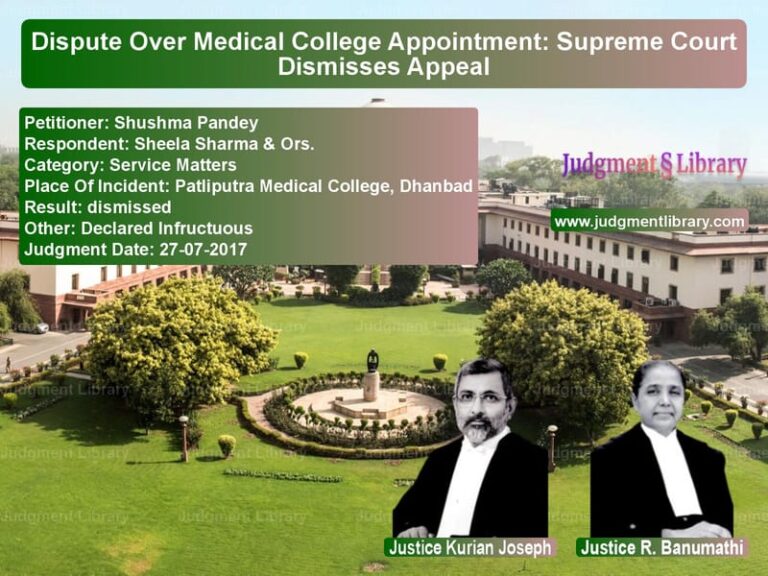Murder Conviction Upheld: Supreme Court Rejects Plea in Bhopal Stabbing Case
The Supreme Court of India, in its judgment dated July 8, 2024, upheld the conviction of Dharmendra Kumar @ Dhamma in a murder case arising from a violent altercation in Bhopal. The case involved the brutal killing of Devi Singh @ Tillu and injuries to another victim, Tularam. The appellant, convicted under Section 302 read with Section 34 of the Indian Penal Code (IPC), had challenged the High Court’s affirmation of his life sentence, citing alleged contradictions in the prosecution’s case.
Background of the Case
The case stemmed from an altercation that escalated into a fatal attack. The sequence of events, as per the prosecution, was:
- On the night of June 20, 2004, around 9:30 PM, a dispute arose over the construction of a wall in a slum area near Navgrah Mandir, Bhopal.
- The victim, Devi Singh @ Tillu, was attacked by a group led by the appellant and co-accused.
- To escape the attack, Tillu ran into an unoccupied jhuggi and locked himself inside.
- The accused, including Dharmendra Kumar, forcibly entered and stabbed Tillu multiple times, causing fatal injuries.
- Another victim, Tularam, who tried to intervene, was also severely beaten and injured.
Prosecution’s Case
The prosecution relied on the following key pieces of evidence:
1. Eyewitness Testimonies
Two primary eyewitnesses, Usha Bai (PW-10) and Lallu Vishwakarma (PW-11), testified against the accused:
- PW-10, the complainant, witnessed the accused forcibly entering the jhuggi and attacking the victims.
- PW-11, another eyewitness, confirmed that the appellant stabbed Tillu in the abdomen.
2. Medical and Forensic Evidence
- Dr. C.S. Jain (PW-13) conducted Tillu’s post-mortem and confirmed multiple stab wounds as the cause of death.
- Dr. Neelam Shrivastava (PW-15) performed Tularam’s post-mortem, confirming he died from head injuries inflicted by a blunt object.
- A knife, allegedly used by the appellant, was recovered from a barrack in Nehru Nagar police line.
- Forensic tests found human blood on the knife, but the blood group analysis was inconclusive.
3. Dying Declaration
Tularam’s statement, recorded before his death, identified the appellant as one of the main attackers.
Defense Arguments
The defense, led by senior counsel Dushyant Dave, contended that:
- The prosecution’s case had contradictions regarding the location of the incident.
- PW-10 had initially stated she did not know some accused.
- The forensic report did not conclusively link the recovered knife to the crime.
- The statement of Tularam was unreliable as no doctor certified his mental fitness.
Supreme Court’s Analysis
1. Contradictions in Witness Testimonies
The Court noted that minor inconsistencies in witness statements were natural and did not discredit the prosecution’s case. It held that:
“Eyewitness accounts are credible, and their testimonies are supported by medical and forensic evidence. The discrepancies pointed out by the defense do not materially affect the case.”
2. Presence of the Appellant
- PW-11 clearly identified the appellant as the person who stabbed the deceased.
- The recovered knife contained human blood, further implicating the appellant.
- The appellant did not provide a valid alibi.
3. Validity of the Dying Declaration
The Court ruled that Tularam’s statement was admissible under Section 32(1) of the Indian Evidence Act and observed:
“The absence of a doctor’s certification does not render the statement invalid. It is corroborated by other evidence, including eyewitness testimonies.”
Final Judgment
- The appeal was dismissed.
- The appellant’s life sentence was upheld.
- If on bail, the appellant was ordered to surrender immediately.
Key Takeaways
- Eyewitness Testimonies are Crucial: The Court relied heavily on consistent witness accounts.
- Forensic Evidence Supports Prosecution: Blood on the knife, though inconclusive in group analysis, was still significant.
- Dying Declarations Hold Weight: Even without a doctor’s certification, they can be admissible if corroborated.
- Minor Contradictions Do Not Weaken Prosecution: The Court reaffirmed that minor discrepancies do not negate strong evidence.
Conclusion
This ruling underscores the importance of corroborative evidence in criminal cases. The Supreme Court’s decision ensures that strong, consistent evidence leads to conviction, preventing accused persons from escaping justice on technical grounds.
Petitioner Name: Dharmendra Kumar @ Dhamma.Respondent Name: State of Madhya Pradesh.Judgment By: Justice Surya Kant, Justice K.V. Viswanathan.Place Of Incident: Bhopal, Madhya Pradesh.Judgment Date: 07-07-2024.
Don’t miss out on the full details! Download the complete judgment in PDF format below and gain valuable insights instantly!
Download Judgment: dharmendra-kumar-@-d-vs-state-of-madhya-prad-supreme-court-of-india-judgment-dated-07-07-2024.pdf
Directly Download Judgment: Directly download this Judgment
See all petitions in Murder Cases
See all petitions in Attempt to Murder Cases
See all petitions in Judgment by Surya Kant
See all petitions in Judgment by K.V. Viswanathan
See all petitions in dismissed
See all petitions in supreme court of India judgments July 2024
See all petitions in 2024 judgments
See all posts in Criminal Cases Category
See all allowed petitions in Criminal Cases Category
See all Dismissed petitions in Criminal Cases Category
See all partially allowed petitions in Criminal Cases Category







